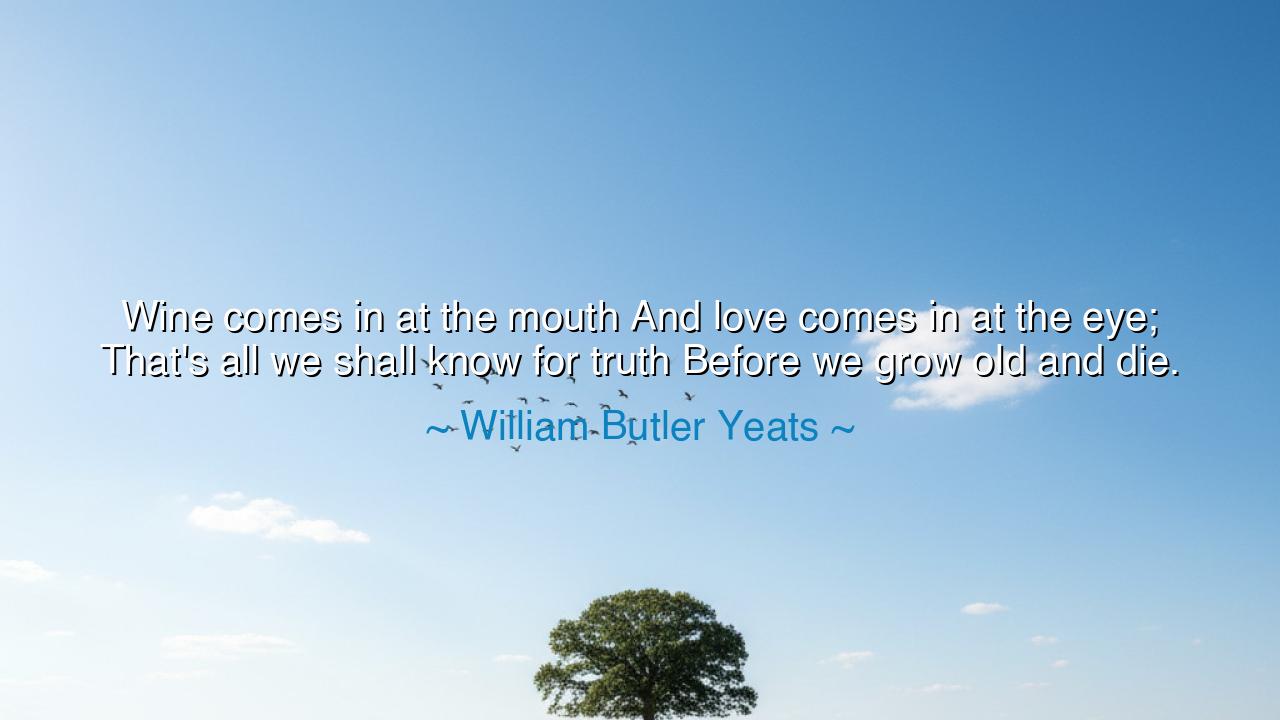
Wine comes in at the mouth And love comes in at the eye; That's
Wine comes in at the mouth And love comes in at the eye; That's all we shall know for truth Before we grow old and die.






The great poet William Butler Yeats, whose words shimmer like embers in the twilight of thought, once wrote:
“Wine comes in at the mouth,
And love comes in at the eye;
That’s all we shall know for truth
Before we grow old and die.”
Though the lines are brief, they are as vast as the ocean in meaning — a meditation on the nature of pleasure, love, and the fleeting truth of human experience. Yeats, who walked between worlds of mysticism and mortal longing, here speaks not as the philosopher or the sage, but as the tender witness of life’s impermanence. He reminds us that while the mind hungers for eternal wisdom, the heart finds its deepest truths in the simple, sensual acts of living — in wine that warms the blood and love that stirs the soul.
In wine, Yeats sees the earthly joy that enters through the senses — the laughter shared, the moment of abandon, the surrender of thought to feeling. Wine, the oldest companion of humankind, symbolizes earthly delight, the sweetness that reminds us we are alive. And in love, he sees the other half of that truth — not the love of reason or duty, but the love that enters through the eye, that awakens when beauty is beheld. For the poet knows that before age dims the senses, before reason turns to dust, it is these two sensations — taste and sight, desire and admiration — that teach us the essence of what it means to be human.
The ancients, too, understood this union of pleasure and passion. In Greece, at the banquets of old, wine flowed as freely as conversation, and poets like Anacreon sang of love and intoxication as twin gifts of the gods. To drink and to love were not mere indulgences, but acts of reverence to life itself. For to taste wine was to honor Dionysus, spirit of ecstasy and creation; to fall in love was to meet Aphrodite, the living flame of beauty. Yeats, centuries later, speaks with that same ancient voice: he tells us that to live fully is not to flee from desire, but to embrace it as the truth our mortal bodies were meant to know.
And yet, there is sorrow in his words — a quiet recognition that these truths are fleeting. “Before we grow old and die.” Here the poet lifts the veil of celebration and shows us the shadow beneath. The joy of wine fades when the cup is emptied; the fire of love cools as time advances. But this impermanence does not cheapen them — it sanctifies them. For in their brevity lies their beauty. The fragility of taste, the fleeting glance of affection — these are the moments that teach us how to treasure what cannot last.
Consider Cleopatra, queen of Egypt, who in her final days reclined upon her throne, raising the cup of wine even as her empire crumbled. She had known both the ecstasy of love and the agony of loss — her affair with Antony, her defiance of Rome. Yet as legend tells, she chose to die not in despair, but with the taste of sweetness upon her lips. Her story, like Yeats’s verse, reminds us that to be human is to feel, to love, to savor the moment before the darkness comes — for those sensations are life itself.
The lesson of Yeats’s poem is neither hedonism nor despair, but presence. It is a call to awaken to the small truths that sustain us — to taste life and to see beauty wherever they appear. We may never grasp the great mysteries of heaven or eternity, but in the warmth of wine and the gaze of love, we encounter something pure, something real.
So, my friend, drink deeply and love boldly, but do so with awareness. Do not chase pleasure as an escape from life — let it remind you of life’s sacredness. Let your heart open through the senses, but keep your soul watchful for meaning. For in the end, as Yeats teaches, all the wisdom we may ever claim lies not in the stars above, but in the simple truths of being alive — the wine that glows in the cup, the love that shines in the eye, and the fleeting moment when both make the soul feel eternal.






AAdministratorAdministrator
Welcome, honored guests. Please leave a comment, we will respond soon